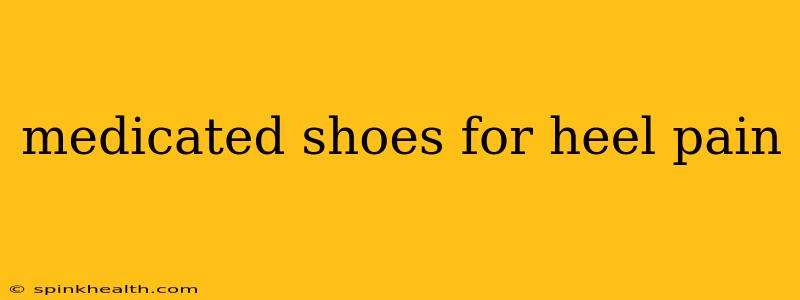Finding Relief: A Journey Through Medicated Shoes and Heel Pain Solutions
Heel pain. That sharp, stabbing, or dull ache that can make even the simplest walk feel like a marathon. It's a common problem, affecting millions, and the search for relief often leads down many paths. One such path involves medicated shoes, and while the term itself might be a bit misleading, understanding what's on offer is crucial for finding the right solution. This isn't about shoes infused with magic potions! Instead, it's about finding footwear designed with specific features to alleviate heel pain.
Let's embark on this journey together, exploring the world of supportive footwear and uncovering the truth behind "medicated shoes" for heel pain.
What are "Medicated Shoes" for Heel Pain?
The term "medicated shoes" is a bit of a misnomer. There aren't shoes literally containing medication. Instead, the term often refers to shoes designed with therapeutic features to address heel pain. These features aim to provide support, cushioning, and proper alignment to reduce stress on the heel and surrounding areas. These might include:
-
Orthotic Inserts: Many shoes marketed for heel pain accommodate or include custom-made or readily available orthotic inserts. These inserts provide arch support and cushioning, correcting foot alignment and distributing weight more evenly.
-
Cushioning: Thick, high-density cushioning in the heel area absorbs shock, reducing impact on the heel bone and surrounding tissues. This is particularly helpful for conditions like plantar fasciitis.
-
Motion Control: Some shoes have features that help control excessive pronation (inward rolling of the foot) or supination (outward rolling), which can contribute to heel pain.
-
Stability: A stable base and firm heel counter offer enhanced support and reduce instability that can aggravate heel pain.
What Causes Heel Pain?
Understanding the root cause of your heel pain is crucial in selecting the right type of footwear. Several common conditions can lead to heel pain, including:
-
Plantar Fasciitis: This is inflammation of the plantar fascia, a thick band of tissue on the bottom of the foot that connects the heel to the toes.
-
Heel Spurs: These are bony growths on the heel bone that can irritate surrounding tissues.
-
Achilles Tendinitis: This is inflammation of the Achilles tendon, which connects the calf muscles to the heel bone.
-
Stress Fractures: Tiny cracks in the heel bone, often caused by repetitive stress or overuse.
-
Bursitis: Inflammation of the bursae, fluid-filled sacs that cushion the heel.
Do Medicated Shoes Actually Work?
The effectiveness of "medicated" shoes (or rather, shoes designed for heel pain) depends heavily on the underlying cause of your pain and the quality of the shoe itself. Shoes with good arch support, cushioning, and proper fit can significantly reduce heel pain for many individuals, particularly those with plantar fasciitis. However, for severe cases or specific conditions, they may not be sufficient on their own. Always consult a podiatrist or doctor to diagnose the cause of your heel pain and receive appropriate treatment.
What Type of Shoe is Best for Heel Pain?
The best shoe for your heel pain will depend on your specific needs and the cause of your pain. However, some general guidelines include:
-
Good Arch Support: Essential for distributing weight evenly and reducing strain on the plantar fascia.
-
Cushioning: Absorbs shock and reduces impact on the heel.
-
Proper Fit: Shoes that are too tight or too loose can worsen heel pain.
-
Stable Heel Counter: Provides support and prevents excessive movement of the heel.
Can I Use Inserts in My Existing Shoes?
Yes, you can. Many people find that adding over-the-counter or custom orthotic inserts to their existing shoes provides significant relief from heel pain. However, ensure the shoes offer enough space to accommodate the inserts comfortably.
Are There Any Specific Brands That Are Recommended?
Several reputable brands manufacture shoes specifically designed for foot support and pain relief. However, specific brand recommendations would require a consultation with a podiatrist or physical therapist who can assess individual needs. The best shoe for one person might not be the best for another.
When Should I See a Doctor About My Heel Pain?
You should consult a doctor if your heel pain is severe, persistent, or doesn't improve with over-the-counter treatments and supportive footwear. They can diagnose the underlying cause and recommend appropriate treatment options, which might include physical therapy, medication, or other interventions.
Ultimately, finding relief from heel pain is a journey of understanding, diagnosis, and finding the right support. While "medicated shoes" might not contain pills, they can offer significant relief through their supportive designs. Remember to consult a healthcare professional for proper diagnosis and treatment. Your journey to comfortable walking starts with a conversation with your healthcare provider.

